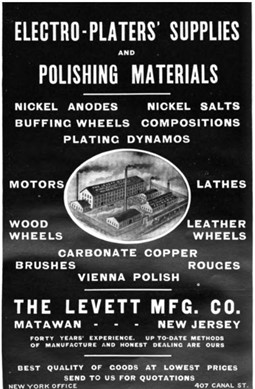Towns and cities blessed with railroads experienced heavier industry with its associated growth in wealth and employment. Communities in Connecticut had their clock companies and the little town I grew up in – Belvidere, IL – had a huge National Sewing Machine Company. Matawan’s key industry that lasted for decades involved the manufacture of metal plating equipment and supplies.
As noted in the account of the Standard Window Shade Company, in 1887 prominent Matawan businessmen organized the Matawan Improvement Company, a joint stock venture incorporated to bring industry to the town. Their initial goal was to purchase land and construct a building which would be occupied by the said New York company, reportedly the largest concern of its kind in the country.
Later that month the company bought tracts of land, constructed a large building and leased it to the Standard Window Shade Company for ten years.
The shade factory remained in business for only a year and after going out of business, the factory was subsequently leased to the Antisell Piano Company in April of 1890. The following month, Antisell built a foundry on the property adjacent to the factory, and the company started producing pianos in September of that year.
Antisell started experiencing financial difficulties in the summer of 1893 and went into receivership that June. Thomas Antisell Sr maintained ownership of the factory until 1901, refurbished it and leased the foundry part to the Matawan Steel and Iron Company. The new company continued to make piano plates.
The next occupant of the factory was the Levett Manufacturing Company. Its roots were in the Zucker, Levett and Loeb Company, which had been incorporated in New York state in June of 1894 to manufacture “polishing materials, plater’s supplies and electrical apparatus.” One of its directors was Alexander Levett (1845-1932).
Alexander was involved in electroplating supply, and his original firm from 1863, the Zucker & Levett Company, was one of the first in the United States. In early 1909. Alexander purchased the Antisell factory and immediately transferred it to his sons. On February 11, 1909, the Matawan Journal reported the incorporation of the Levett Manufacturing Company with a capitalization of $300,000 – $100,000 in preferred stock and $20,000 in common stock – with the intent of manufacturing electrical dynamos, motors, batteries, electrical appliances, etc., in the former Antisell Piano factory. President was listed as Frederick Walter Levett (1872-1938) and twin sons Vice President Charles Martin Levett (1882-1951) and Treasurer Frank Martin Levett (1882-after 1940). Treasurer was listed as H. S. Wycoff.
The company initially produced nickel platers’ supplies and polishing material and added electrical dynamos and motors later. Initially employing around two dozen individuals, media articles cited a lack of adequate workers’ housing in the Matawan area as a concern. This was an issue with other industries when they initially came to the area at that time.
In September of 1909, Levitt moved its business office back to New York City but maintained its factory on Church Street.
As with any heavy pre-OSHA industry, serious accidents were common in factories. In April of 1910, George Clark, Jr, lost a finger on a press in the building. In October of that year, Mildred Carter of South Keyport caught her hand between heated iron rollers of a press and lost three fingers.
On May 3, 1910, Levett cut women employee’s wages, which were currently $1.25 to $1.50 a day, by three quarters and they went on strike. The strike lasted 16 days, and Levett rescinded the cut. The next month, the company declared it would give its workers “their holiday” on Saturdays during the summer.
A fire in the factory in early 1911 destroyed its steam engine, which was subsequently replaced with a more modern engine. In early March of that year, the company moved its business office from New York City back to Matawan.
On March 11, 1911, the company went into receivership and subsequently declared bankruptcy in early May. On May 19, 1911, the Keyport Weekly reported that articles of incorporation were filed in Trenton for the Munning-Loeb Company of Matawan, which would continue to manufacture electroplating material in the Levett factory.

NO COMMENTS